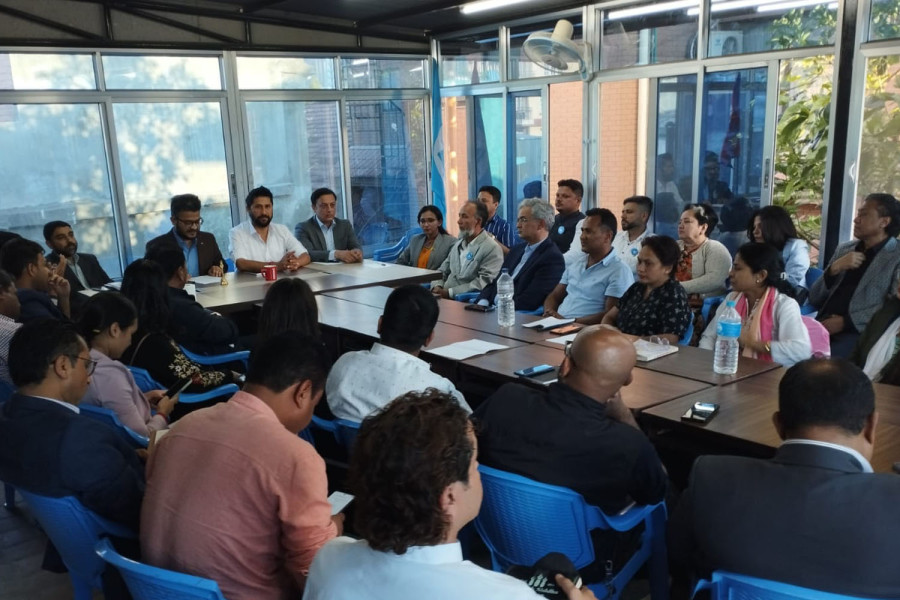National
Swatantra Party withdraws support to the government
Constitutional experts divided over whether PM Dahal needs to get a fresh vote of confidence in Parliament.
Nishan Khatiwada
The Rastriya Swatantra Party has decided to withdraw its support to the government. A joint meeting of the party’s central committee and the parliamentary party on Friday decided to pull its support for the Prime Minister Pushpa Kamal Dahal-led government.
“We should respect public aspiration and mandate. The by-elections mandate us to play the role of a strong opposition and strengthen the party organisation,” said party chair Rabi Lamichhane, talking to journalists after the meeting.
Lamichhane added that the party will look to show the people how a constructive opposition party works.
After the Rastriya Swatantra Party’s candidates registered resounding wins against the candidates of the ruling coalition comprising big political parties in two of the three constituencies in last month’s by-polls, Dahal had appeared keen to induct the RSP into the Cabinet.
But, surprisingly, in his latest Cabinet expansion on Wednesday, Prime Minister Dahal inducted three ministers from the Nepali Congress who were all sworn in on Thursday.
“We realised after the bypolls that the public had given us the mandate to stay in the opposition, raise issues of public concern and put pressure on the government to address them,” said Santosh Pariyar, the party’s chief whip. “Moreover, we wanted a decent share in the government based on our current strength and popularity. But we saw that this was not possible after the recent political development [of the appointment of new Congress ministers in vacant portfolios].”
According to Pariyar, the party has also realised the importance of building its organisation that is still in its infancy. “We must convert the strong public support into a strong party structure, which is also why most of us spoke against joining the government.”
With the Rastriya Swatantra Party clarifying its position, a debate has surfaced on whether the prime minister has to seek another vote of confidence. Constitutional experts are divided over whether Dahal needs to prove his majority through another floor test.
Article 100 (2) of the Constitution of Nepal says “the prime minister shall table a motion for a vote of confidence in the House of Representatives if the party which the prime minister represents is divided or the party in the government withdraws its support”.
According to constitutional expert Bipin Adhikari, the article is applicable only if the parties that are a part of the Cabinet withdraw their support. As the RSP was not a part of the government and as its pulling out will not throw the government into a minority, “its support or withdrawal will not be the reason to attract that article of the constitution,” Adhikari told the Post.
Ganesh Datta Bhatta, a former associate professor at Nepal Law Campus, disagrees. “In the past, the prime minister has had to see a vote of confidence in similar cases. The constitution clearly states that if a party supporting the government withdraws, a confidence motion should be tabled,” he said. “Whether the prime minister has the majority should be tested in the Parliament. We cannot make guesses from the outside.”
Doubts had surfaced over the RSP’s participation in the government over the readiness of coalition partners to forgo the ministries under their control in order to make way for the new party.
Currently, CPN (Maoist Centre) senior vice-chair Narayan Kaji Shrestha is leading the home ministry while the Janata Samajbadi Party’s Ashok Rai heads the education ministry. Likewise, the Loktantrik Samajbadi Party’s senior leader Sharat Singh Bhandari is the minister for Labour, Employment and Social Security.
The RSP had made these ministries its bottomline for joining the government. Earlier, party chair Lamichhane was at the helm of the home ministry as deputy prime minister, while DP Aryal led the labour ministry. Sishir Khanal was the education minister and Dr Toshima Karki the state minister for health and population from the RSP.
But after the prime minister added three ministers from Congress, the Dahal-led Cabinet only had only two vacant ministries—the Water Supply, and the Forest and Environment.
Loktantrik Samajbadi Party leader Keshav Jha said the RSP’s big demands were a problem. “The harmony and stability of the ruling coalition would have been greatly hampered if it would have given in to the RSP’s demands. The prime minister was not in a position to do that. But he did try to accommodate the RSP in the government, respecting the public support for the party,” Jha told the Post.
Coalition leaders claim the RSP’s decision to sit in the opposition will make no substantial difference to the government’s functioning.
“The government is in a comfortable position even without the Rastriya Swatantra Party. Yes, the participation of an emerging force could have boosted its effectiveness, but not by much,” said CPN (Unified Socialist) vice chair Pramesh Hamal.
Jha echoed Hamal, saying, “It will not matter at all technically or in the government’s performance if the Rastriya Swatantra Party withdraws its support to the government. The way it bargained was not right.”
Political watchers say the RSP would be better served by staying out of the governments.
In the reckoning of political analyst Jhalak Subedi, it will be politically beneficial for the RSP to regularly raise issues of public concerns, press the traditional and ruling forces to deliver, flag bad governance and raise ground-level issues. “As such, their popularity will increase. If they play a creative role in Parliament, it will be good for the country as well. The old parties have only been interested in getting to power and serving their own interest,” he said.
Subedi asserted that if the RSP too got involved in the business of making and breaking coalitions and sidelining issues of public concern, public disenchantment would only grow.




 10.12°C Kathmandu
10.12°C Kathmandu














